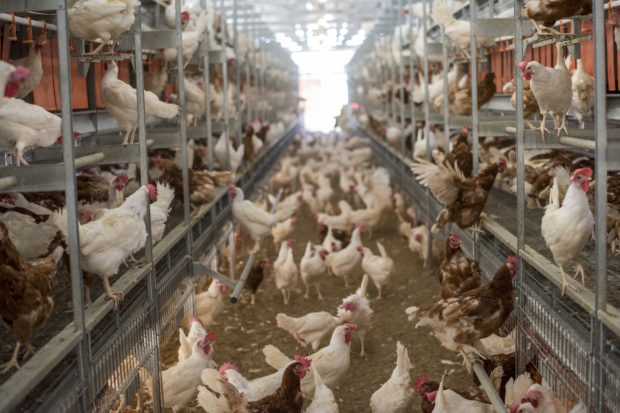Some of the biggest gains and turning points in our movement have come through the ballot initiative process, when The HSUS and other groups sidestepped state lawmakers unwilling to take action to stop animal cruelty and appealed directly to the people by qualifying and passing animal protection reforms. Since The HSUS threw its weight behind direct democratic action in the states in 1990 – with voter approval of Prop 117 in California to outlaw the trophy hunting of mountain lions – we’ve racked up an incredible win rate on a wide range of issues.
The passage of Prop 2 in California – to ban the extreme confinement of veal calves, breeding sows, and laying hens – helped reshape the debate on farm animal protection in the United States. Our series of three winning anti-cockfighting ballot measures – in Arizona, Missouri, and Oklahoma – stopped plenty of intentional cruelty and set us up to run the table with remaining states where the practice was legal. It also positioned us to enact a comprehensive national ban on cockfighting through our work in Congress. When voters swamped the NRA and overwhelmingly rejected the target shooting of mourning doves and the trophy hunting of wolves, it revealed that certain forms of hunting simply don’t curry favor with the public, even in a Rust Belt state with major traditions of farming and hunting.

If we prevail in Massachusetts, eggs, pork, and veal sold in the Bay State will have to be produced by cage-free animals. Above, hens in a cage-free facility. Photo by David Paul Morris/For The HSUS
With the conventions over, there’s no mistaking that we are in the heart of the political season. The general election looms. Candidate races will have enormous implications for animals, but there are a series of measures on state ballots where animal issues will be decided directly by voters. The HSUS and its affiliates will actively support three measures – in Massachusetts, Montana, and Oregon. Of course, with our progress, there is always an inevitable political backlash, and that’s in evidence in Oklahoma, where lawmakers have referred a draconian measure to the ballot designed to thwart future gains for animals in the state.
Yes on Question 3 in Massachusetts: The central front in the national debate about farm animal confinement for the next four months will be in Massachusetts, where voters will decide this November on Question 3. If we prevail, eggs, pork, and veal sold in the Bay State will have to be produced by cage-free animals. The agribusiness lobby sued to try to keep us off the ballot, but the Massachusetts Supreme Court recently ruled unanimously in our favor, allowing the measure to proceed.
Yes on I-177 in Montana: In late June, grassroots advocates qualified a ballot measure to end commercial and recreational trapping on public lands in Montana to protect people, pets, and wildlife from indiscriminate, hidden, and baited traps. The initiative is based on the principle that Montana’s public lands, and the wildlife on them, are held in the public trust. Steel-jawed leghold traps and other body-gripping traps are indiscriminate, cruel, and dangerous, and make those public lands unsafe for pets and wildlife. They also encourage lopsided, profit-driven use of animals and other public resources.
Yes to stop wildlife trafficking in Oregon: Oregon has joined the global movement to stop illegal wildlife trafficking and the barbaric methods poachers employ to kill elephants, rhinos, and other endangered animals teetering on extinction. More than 400 volunteers from across the state helped collect more than 150,000 signatures to ensure Oregon voters have the opportunity to take a stand this November. Oregon is now poised to join Washington, Hawaii, and California as the last state on the West Coast to shut down local markets for those who seek to profit from this destructive wildlife trade. Washington voters approved a very similar ballot measure last November.
No on State Question 777 in Oklahoma: This misleading measure — titled “Right to Farm” but more accurately characterized as “Right to Harm” – found its place on the ballot after the Oklahoma Farm Bureau and other agribusiness interests convinced state lawmakers to refer it there. This constitutional amendment would prevent voters and even legislators from making reforms that would benefit food safety animal welfare and the quality of Oklahoma’s land, air, and water. It is so broadly and vaguely written that anyone describing themselves as being involved in agricultural production and technology will be shielded from future oversight or accountability by the state, including puppy mills and cockfighting operations. The Right to Farm initiative is a national interest by industrial factory farming interest to stop our progress on animal protection. This past year we were successful in stopping Right to Farm constitutional measures in both the West Virginia and Nebraska legislatures, and just this week, the Nebraska Farm Bureau said that it would suspend future efforts to amend its constitution to create a “right to farm.”
More than ever, animal protection ideas are ascendant – as evidenced by gains in the corporate and political realms and a growing consciousness about animals and their intelligence — and we are better positioned than ever to prevail in all the domains in which we work. But as with any social reform, intentional, determined action is needed. There is so much at stake with this election, and your votes, your dollars, and your voices will be crucial to achieving the best outcomes.
The post Animal issues to highlight election ballots in four states appeared first on A Humane Nation.
Enviroshop is maintained by dedicated NetSys Interactive Inc. owners & employees who generously contribute their time to maintenance & editing, web design, custom programming, & website hosting for Enviroshop.
